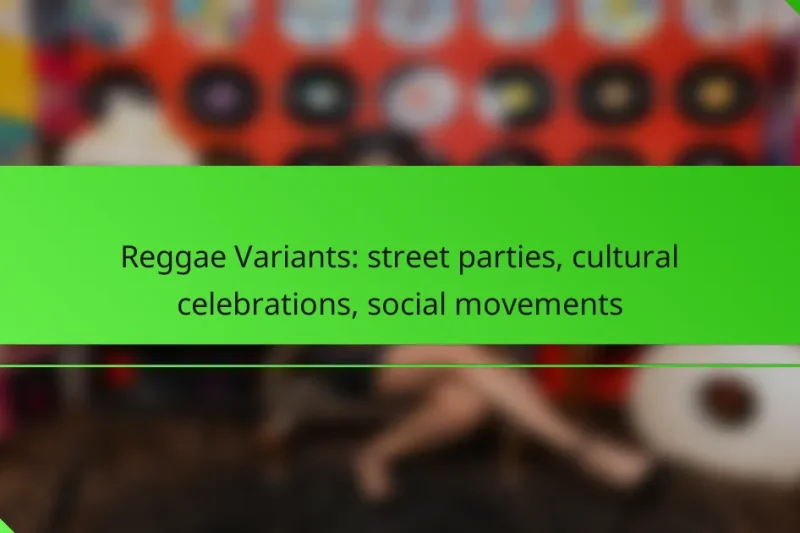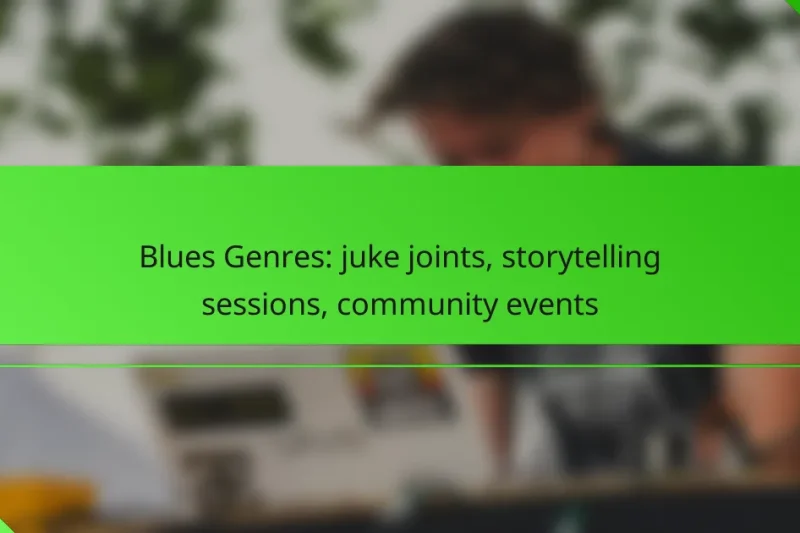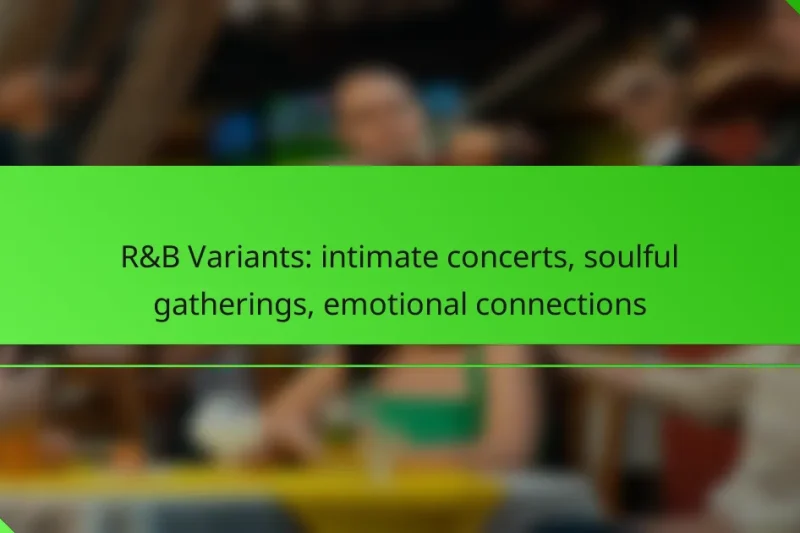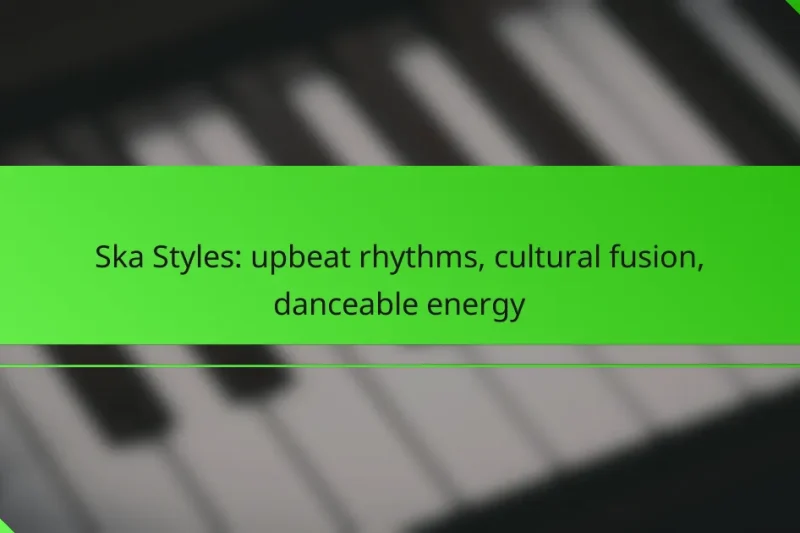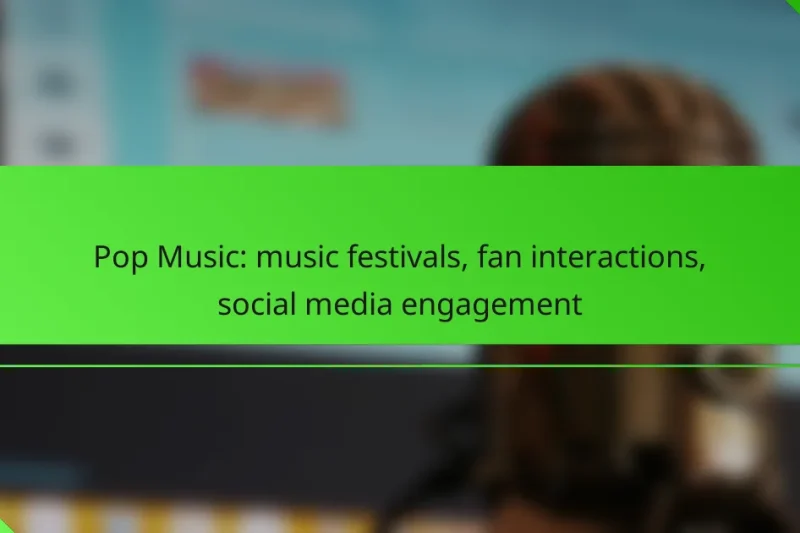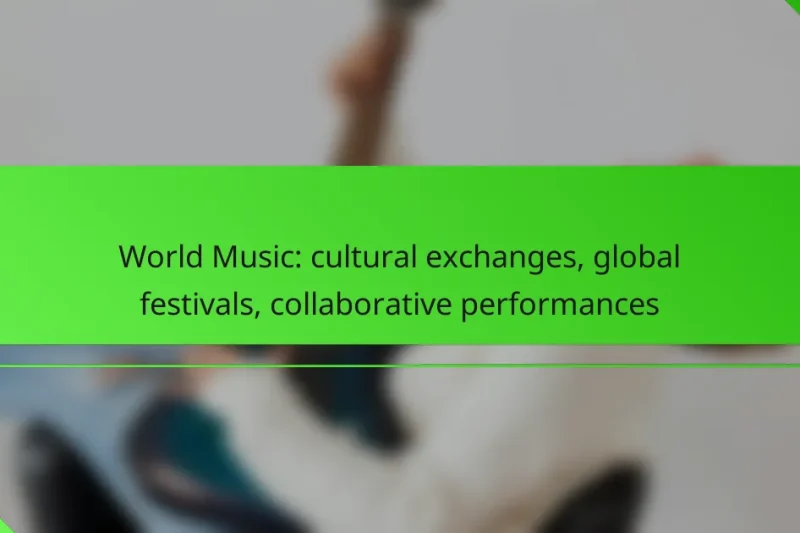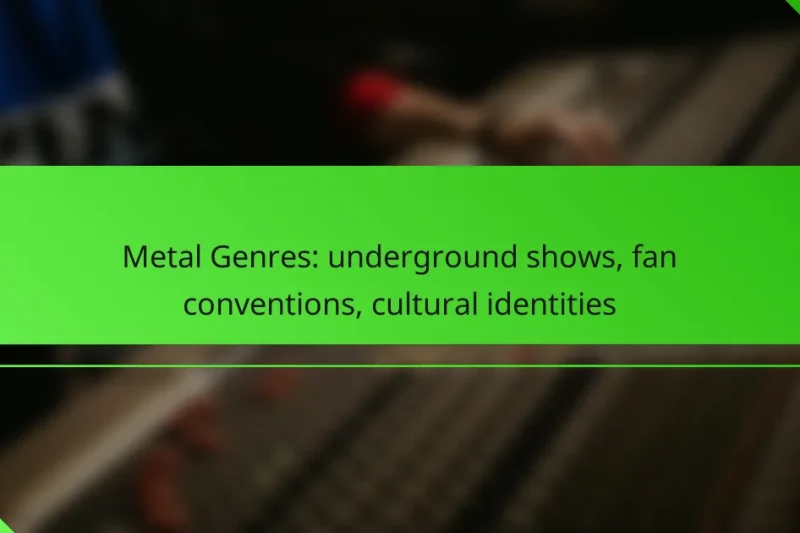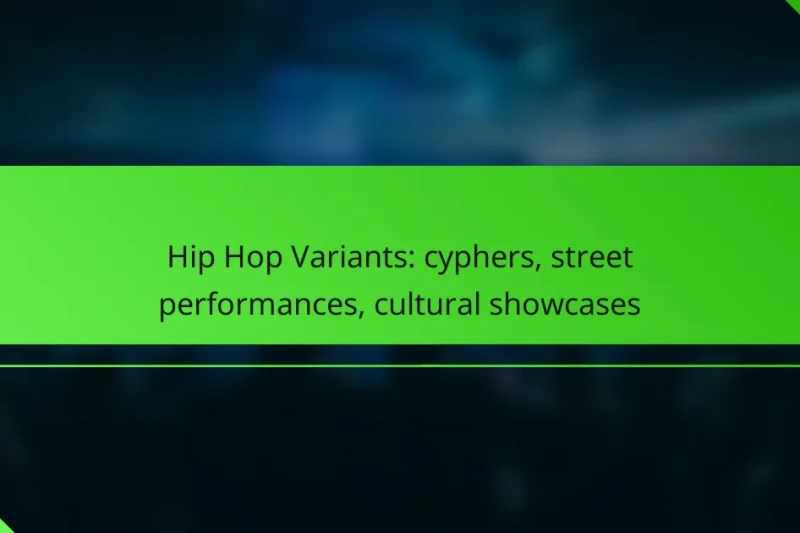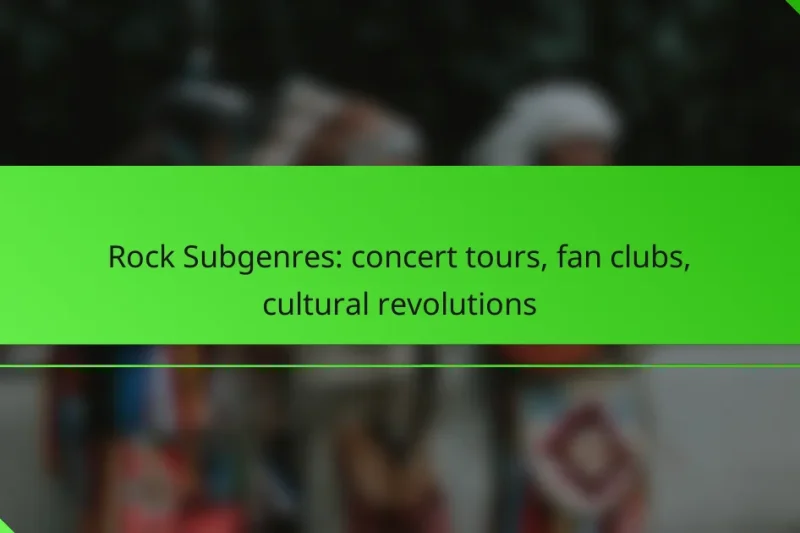Reggae music serves as a vibrant backdrop for street parties and cultural celebrations that unite communities … Reggae Variants: street parties, cultural celebrations, social movementsRead more
Experiencing Music Genres Around the World
Music is a universal language that transcends borders, allowing us to experience diverse cultures through their unique genres. From the vibrant live music scene in London to the rich tapestry of sounds across the UK, each genre offers a glimpse into the cultural significance and artistic expression of its origin. Whether you’re exploring local festivals or seeking out intimate gigs, there’s always a new musical adventure waiting to be discovered.
Blues Genres: juke joints, storytelling sessions, community events
Blues music thrives in vibrant juke joints and storytelling sessions, where local talent and community spirit … Blues Genres: juke joints, storytelling sessions, community eventsRead more
R&B Variants: intimate concerts, soulful gatherings, emotional connections
R&B music offers a unique opportunity for intimate concerts that create deep emotional connections between artists … R&B Variants: intimate concerts, soulful gatherings, emotional connectionsRead more
Ska Styles: upbeat rhythms, cultural fusion, danceable energy
Ska music is a vibrant genre known for its upbeat rhythms and infectious energy, blending elements … Ska Styles: upbeat rhythms, cultural fusion, danceable energyRead more
Pop Music: music festivals, fan interactions, social media engagement
Pop music festivals in the UK, such as Glastonbury and Wireless, draw fans globally with their … Pop Music: music festivals, fan interactions, social media engagementRead more
World Music: cultural exchanges, global festivals, collaborative performances
World music serves as a vibrant platform for cultural exchanges, uniting diverse musical traditions and fostering … World Music: cultural exchanges, global festivals, collaborative performancesRead more
Metal Genres: underground shows, fan conventions, cultural identities
The underground metal scene in the UK is a thriving hub of creativity, featuring festivals that … Metal Genres: underground shows, fan conventions, cultural identitiesRead more
Classical Compositions: concert hall experiences, formal attire, audience etiquette
Attending a classical concert is a unique experience that combines the beauty of music with the … Classical Compositions: concert hall experiences, formal attire, audience etiquetteRead more
Hip Hop Variants: cyphers, street performances, cultural showcases
Hip hop is a diverse and dynamic cultural movement that encompasses various forms of expression, including … Hip Hop Variants: cyphers, street performances, cultural showcasesRead more
Rock Subgenres: concert tours, fan clubs, cultural revolutions
Rock subgenres such as alternative rock, punk rock, metal, indie rock, and progressive rock play a … Rock Subgenres: concert tours, fan clubs, cultural revolutionsRead more
How can you experience music genres in London?
Experiencing music genres in London involves exploring its vibrant live music scene, attending diverse festivals, and visiting local music shops. The city offers a rich tapestry of musical experiences that cater to various tastes and preferences.
Live music venues in London
London boasts a plethora of live music venues, ranging from intimate clubs to large arenas. Popular spots like the O2 Arena and the Roundhouse host international acts, while smaller venues such as the Jazz Café and The Old Blue Last feature emerging artists and niche genres.
When planning a visit, check the venue’s schedule online for upcoming performances. Many venues also offer ticket discounts for students or early bookings, making it more accessible to enjoy live music.
Music festivals in London
London hosts numerous music festivals throughout the year, showcasing a variety of genres. Notable events include the British Summer Time Festival in Hyde Park and the Wireless Festival, which feature both established and up-and-coming artists.
To make the most of these festivals, consider purchasing tickets in advance, as they often sell out quickly. Arriving early can also enhance your experience, allowing you to explore different stages and discover new music.
Local music shops in London
Local music shops in London, such as Rough Trade and Sister Ray, offer a wide selection of vinyl records, CDs, and music merchandise. These shops often host in-store performances and signings, providing a unique opportunity to connect with artists.
When visiting, take time to browse the collections and ask staff for recommendations. Many shops also have knowledgeable staff who can help you find rare items or introduce you to new genres.
What are the popular music genres in the UK?
The UK is known for a diverse range of popular music genres, including rock, grime, and electronic music. Each genre has its own unique characteristics and cultural significance, contributing to the vibrant music scene in the country.
Rock music
Rock music has deep roots in the UK, with iconic bands like The Beatles and The Rolling Stones shaping its history. This genre typically features electric guitars, strong rhythms, and powerful vocals, appealing to a wide audience.
In the UK, rock music has evolved into various subgenres, including alternative rock, punk rock, and indie rock. Festivals such as Glastonbury and Reading & Leeds showcase both established and emerging rock artists, making them key events for fans.
Grime music
Grime music originated in East London in the early 2000s and is characterized by its fast-paced beats and gritty lyrics. This genre blends elements of UK garage, hip-hop, and dancehall, creating a distinctive sound that resonates with urban youth.
Artists like Stormzy and Skepta have brought grime to mainstream attention, and the genre often addresses social issues and personal experiences. Grime events and battles, such as those held at the iconic Boiler Room, are essential for fans to connect with the culture.
Electronic music
Electronic music encompasses a wide range of styles, including house, techno, and drum and bass, and has a significant following in the UK. The genre relies heavily on synthesizers and digital production techniques, creating innovative sounds that appeal to club-goers and festival attendees.
Major events like the UK’s Creamfields and Fabric nightclub in London are pivotal in promoting electronic music. The genre’s popularity continues to grow, with many artists experimenting and blending styles to create fresh, exciting tracks.
How to find music genre events near you?
To find music genre events near you, start by exploring online platforms and local social media groups. These resources can connect you with upcoming concerts, festivals, and smaller gigs that match your musical interests.
Event platforms like Songkick
Event platforms such as Songkick allow users to track their favorite artists and receive notifications about nearby concerts. By entering your location, you can discover a range of events from large festivals to intimate shows.
Many platforms offer additional features like ticket purchasing and artist recommendations based on your listening habits. Make sure to check for user reviews and ratings to gauge the quality of the events.
Social media groups for local music
Joining social media groups focused on local music can provide insights into grassroots events and emerging artists. Platforms like Facebook often have dedicated groups where members share information about gigs and festivals in your area.
Engage with the community by asking for recommendations and sharing your own experiences. This interaction can lead to discovering unique events that may not be widely advertised, enhancing your local music experience.
What are the characteristics of world music genres?
World music genres are diverse styles that reflect the cultural heritage and traditions of different regions. They often incorporate unique rhythms, melodies, and instruments, showcasing the rich tapestry of human expression through sound.
Folk music traditions
Folk music traditions vary widely across cultures, often serving as a means of storytelling and preserving history. For example, Irish folk music is characterized by its use of traditional instruments like the fiddle and bodhrán, while African folk music may include call-and-response patterns and percussion instruments such as djembe.
These traditions can be deeply rooted in local customs and are often passed down through generations. Engaging with folk music can provide insight into the values and experiences of a community, making it a vital aspect of cultural identity.
Instruments used in different genres
The instruments used in world music genres are as varied as the cultures they represent. For instance, the sitar is prominent in Indian classical music, while the marimba is essential in various African and Latin American styles. Each instrument contributes to the genre’s distinct sound and emotional impact.
When exploring these genres, consider the role of instruments in shaping musical structure and expression. For example, string instruments may convey a sense of intimacy, while percussion can drive energy and rhythm. Understanding these nuances enhances appreciation for the music and its cultural significance.
How do music genres influence cultural identity?
Music genres play a significant role in shaping cultural identity by reflecting the values, traditions, and experiences of a community. They serve as a means of expression and connection, allowing individuals to identify with their heritage and share it with others.
Regional music styles
Regional music styles vary widely across the globe, often influenced by local history, geography, and cultural practices. For instance, Flamenco in Spain embodies the passion and spirit of Andalusian culture, while Reggae from Jamaica reflects themes of social justice and resilience. Each genre carries unique instruments, rhythms, and melodies that resonate with the local populace.
Understanding these regional styles can enhance appreciation for the music and its cultural context. For example, learning about the origins of the blues in the American South can deepen one’s connection to the genre and its historical significance.
Impact on local communities
Music genres can significantly impact local communities by fostering social cohesion and cultural pride. Community events, such as festivals and concerts, often celebrate specific genres, bringing people together and strengthening bonds. This can lead to increased tourism and economic benefits for the area.
Moreover, music can serve as a platform for social change, with genres like Hip-Hop addressing issues such as inequality and injustice. Engaging with local music can empower communities to express their identities and advocate for their rights.
What are the emerging music genres in 2023?
In 2023, several emerging music genres are gaining popularity, reflecting diverse cultural influences and innovative sounds. Genres like Afrobeats, hyperpop, and lo-fi hip-hop are at the forefront, appealing to a wide range of audiences globally.
Afrobeats
Afrobeats is a vibrant music genre originating from West Africa, particularly Nigeria and Ghana. It blends traditional African rhythms with contemporary pop, hip-hop, and dance music, creating infectious beats that are perfect for dancing.
Key characteristics of Afrobeats include its use of rich percussion, catchy melodies, and often socially conscious lyrics. Artists like Burna Boy and Wizkid have popularized this genre internationally, showcasing its appeal beyond African borders.
For those looking to explore Afrobeats, consider listening to popular tracks on streaming platforms or attending live performances. Engaging with the genre’s dance culture can also enhance your experience, as dance is integral to Afrobeats music and events.
